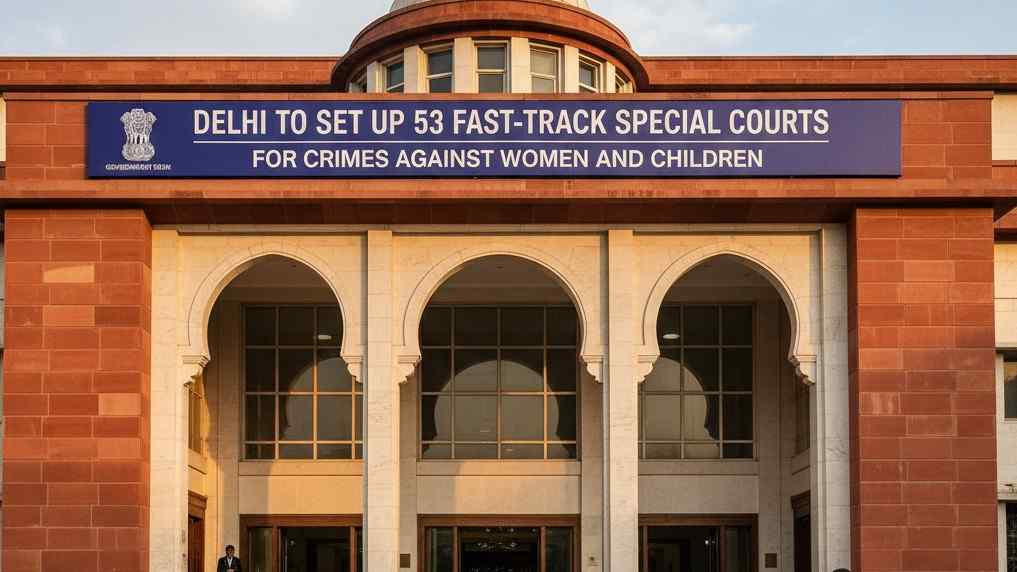Delhi announces 53 fast-track special courts for speedy trials under POCSO and rape laws. A step towards justice for women and child safety.
Introduction
Crimes against women and children have long been a pressing concern in India. Despite stringent laws like the Protection of Children from Sexual Offences (POCSO) Act, 2012, and legal provisions for crimes such as rape, the justice system often faces delays. Victims and their families are left waiting for years while the accused remain free on bail.
To address this gap, the Delhi government recently announced the creation of 53 fast-track special courts (FTSCs). These courts are designed to speed up trials involving crimes against women and children, ensuring swift justice, deterrence for offenders, and greater faith in the legal system.
Why Fast-Track Special Courts Are Needed
- Rising Crime Rates
NCRB (National Crime Records Bureau) data consistently shows an alarming rise in sexual offences against women and children. Delhi, in particular, is often referred to as the “crime capital,” highlighting the urgency of reforms. - Judicial Backlog
Courts in India face massive pendency. As of 2025, more than 5 crore cases are pending across the country, and crimes against women and children form a significant share. Fast-track courts help reduce this burden by prioritizing sensitive cases. - Justice Delayed is Justice Denied
Delayed trials not only traumatize survivors but also weaken evidence and witness testimony. Quick disposal ensures greater conviction rates and prevents repeated victimization.
Key Features of the 53 New Fast-Track Special Courts
- Dedicated Jurisdiction: These courts will exclusively hear cases related to rape, sexual assault, and offences under the POCSO Act.
- Specially Trained Judges: Judges with experience in gender-sensitive matters will preside, ensuring victim-friendly proceedings.
- Time-Bound Trials: The aim is to complete trials within 6–12 months, unlike the regular system where cases drag for years.
- Child-Friendly Infrastructure: For POCSO cases, courts will be equipped with child-friendly waiting areas, separate entrances, and video conferencing facilities to reduce trauma.
- Coordination with Support Services: Legal aid, counselors, and victim compensation schemes will be integrated with the court process.
Legal Framework Supporting FTSCs
- POCSO Act, 2012
Mandates child-friendly procedures, in-camera trials, and speedy disposal of sexual offence cases. - Criminal Law (Amendment) Act, 2018
Introduced stricter punishments and emphasized faster trials, especially in cases involving minors. - Fast-Track Special Courts Scheme
Launched by the central government in 2019 to set up 1,023 FTSCs across India, partly funded by the Nirbhaya Fund.
Delhi’s move to create 53 additional FTSCs aligns with these national initiatives, reinforcing a commitment to prioritizing justice for women and children.
Expected Impact
- Faster Justice Delivery
With exclusive focus on sensitive crimes, trials will conclude more quickly, preventing endless adjournments. - Higher Conviction Rates
Swift proceedings reduce the chances of witness hostility and ensure evidence is preserved. - Public Confidence
The visible commitment to justice strengthens faith in the system, encouraging more survivors to come forward. - Deterrence for Offenders
Knowing that cases will not drag on for years creates fear of swift punishment, acting as a deterrent.
Challenges Ahead
- Infrastructure and Staffing
Setting up courts requires trained judges, prosecutors, clerks, and support staff. Shortages could slow down progress. - Implementation Gaps
Past fast-track courts in India have faced delays due to a lack of coordination between police, prosecutors, and the judiciary. - Victim Support Mechanisms
Without proper counseling, witness protection, and rehabilitation, survivors may still struggle despite quicker trials. - Sustainability
Long-term success depends on consistent funding and monitoring. Without it, the courts may become overburdened like regular ones.
Government and Public Response
The announcement has been widely welcomed by women’s rights activists, legal experts, and NGOs. They emphasize that while FTSCs are a positive step, systemic changes such as gender sensitization in police forces, better investigation practices, and victim support services are equally important.
Conclusion
The establishment of 53 fast-track special courts in Delhi is a landmark step towards making the justice system more responsive to the needs of women and children. While challenges remain, the initiative reflects a strong political and legal will to prioritize vulnerable groups. If implemented effectively, these courts can transform the landscape of gender justice in Delhi and set a model for the rest of India.
FAQs
What is a fast-track special court (FTSC)?
A FTSC is a dedicated court set up to handle specific categories of cases—here, crimes against women and children—on a priority basis to ensure speedy trials.
Why did Delhi decide to create 53 FTSCs?
Delhi faces one of the highest crime rates against women and children in India. These courts are meant to reduce case pendency and deliver justice more swiftly.
Will these courts really ensure faster justice?
Yes, if adequately staffed and funded. Experience from other states shows that FTSCs can reduce trial time significantly.

























